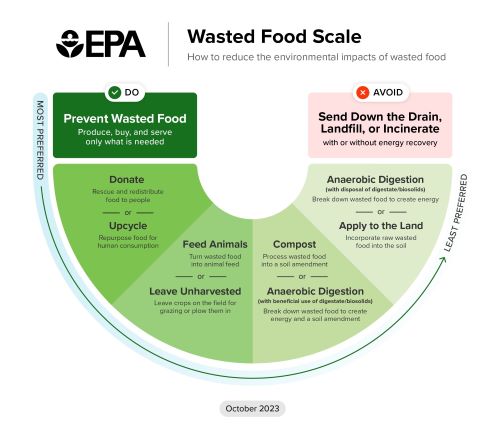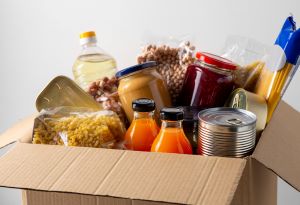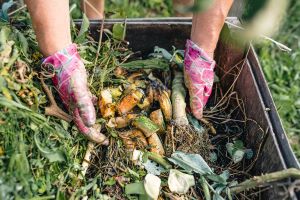
Food
Wasted excess food makes up a large portion of our solid waste stream. Rather than disposing of excess food, consider donation or composting. According to the EPA Food Recovery Hierarchy, source reduction is the best way to reduce surplus food (e.g., improving food storage and consumption practices), followed by donation to feed hungry people and animals before diverting to industrial uses and composting. Disposal in landfills and incinerators is least preferred.
To save money and avoid wasting edible food, make sure you are storing your food properly!
- SaveTheFood.com interactive storage guide with tips, tricks and information to keep your food fresh and tasty for as long as possible.
- Watch Video: Meal Planning and Other Tips (1-minute)
- Watch Video: Understanding Date Labels (2-minutes)

Food donations
 Have excess edible food? Contact your local food pantry, soup kitchen, veterans’ home, or shelter to put quality, edible food to its highest and best use. Ask ahead of time to learn what they will accept for donation.
Have excess edible food? Contact your local food pantry, soup kitchen, veterans’ home, or shelter to put quality, edible food to its highest and best use. Ask ahead of time to learn what they will accept for donation.
Food donation guidance:
- Harvard Food Law & Policy Clinic
- Federal Liability Protection for Food Donation – Bill Emerson Good Samaritan Act.
- State-specific food waste fact sheets – Information about date labels, feeding food scraps to animals, liability protections and tax incentives.
- Northeast Waste Management Officials’ Association (NEWMOA) Fact Sheet: Food Donation.
Where to donate excess food in New Hampshire:
- New Hampshire Food Bank Distribution Map.
- University of New Hampshire (UNH) Food Access Map.
- UNH Map of New Hampshire Farms.
Food scraps
 Food scraps can be combined with other organic material (e.g., leaf and yard waste, untreated wood shavings, sawdust, paper products, small quantities of ash from household woodstoves) to make compost – a nutrient-rich soil amendment that can build soil health, prevent erosion and improve plant growth. Composting your food scraps helps conserve landfill space and helps to reduce greenhouse emissions associated with decomposition of organic materials in landfills.
Food scraps can be combined with other organic material (e.g., leaf and yard waste, untreated wood shavings, sawdust, paper products, small quantities of ash from household woodstoves) to make compost – a nutrient-rich soil amendment that can build soil health, prevent erosion and improve plant growth. Composting your food scraps helps conserve landfill space and helps to reduce greenhouse emissions associated with decomposition of organic materials in landfills.
Options for managing food scraps:
- Compost at home or in a community setting (e.g., community garden).
- Sign up for a curbside food scrap collection program with a hauler servicing your town.
- Drop off your food scraps at a facility authorized to accept source-separated organics (e.g., farm, commercial composting facility, transfer station, etc.).
Check with your local transfer station about food scrap management options available to you.
- Northeast Resource Recovery Association Food Composting and Diversion Services.
- NEWMOA Guide to Backyard Composting.
- Watch Video: How to Compost at Home (2 minutes).
- Institute for Local Self Reliance (ILSR) Webpage – Home Composting Basics.
- ILSR Community Composting BMP Guide.
- Composting Association of Vermont On-Farm Composting Toolkit.
Questions?
Please contact the Solid Waste General Helpline via email at solidwasteinfo@des.nh.gov or by phone at (603) 271-2925.
Visit our Managing My Waste page to learn about other types of household waste.




